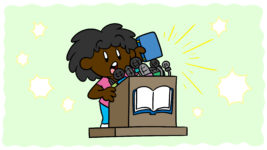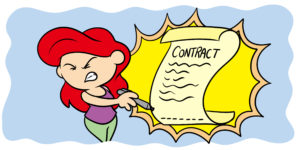Criticism is essential for authors, but that doesn’t stop it from stinging. Whether from beta readers, contemporaries, or honest-to-goodness critics, it’s something we absolutely need and absolutely dread.
Whatever personal motivation you may possess, great writers write for their readers. That means that other people’s judgements are always going to be part of your creative process. Because of this, every author needs to find a way to deal with criticism.
But what if you can do more than that? What if instead of just dealing with criticism you can use it to improve your writing? That’s the aim of this article: to equip you with the four questions you need to get maximum use out of any criticism. For this four-question system to be most effective, it’s best to write it down. That way you can attach it to any criticism you decide to keep, so the vital context is always at your fingertips.
Everyone is sensitive about their work, but hopefully by making these questions your standard response to criticism you won’t miss out on anything useful due to hurt feelings.
Question 1: Who said it?
Nothing in the world is written for everyone. Our tastes are too varied and our experiences too disparate. This means that whatever you write is not intended for everyone, no matter how well you do so. In fact it can be useful, both for using criticism and for marketing your work, to write down a few qualities of your intended audience as soon as you can identify them.
Asking ‘who said it?’ allows you to apply the context of the source to any criticism. If a person is not your intended reader then that’s vital information, it suggests that there are certain problems they should have with the book.
The identity of the critic also provides the context of authority. If the criticism comes from a layperson then that tells you something about the reader’s experience. If the criticism is from another author, this question reveals their strengths and weaknesses, and may be more technical (which will be relevant later). What are their personal skills or shortcomings, the biases through which they are viewing your work? If it comes from a critic then there’s likely a bit of experience behind their feedback.
Knowing who the criticism is coming from tells you how to handle the criticism; whether you can dive straight in looking for the useful feedback, or whether it is likely to be negative and needs ‘defusing’ first.
Question 2: Why did they say it?
Having established the nature of the source and their authority, it’s time to consider their motivations. Hopefully this will be ‘honest feedback’, but sometimes the reasons may be more complex such as ‘ideological objections’ or, for critics, ‘as entertainment’. After all, a critic who only says good things won’t be in a job for long.
This is one of the chief ways of ‘defusing’ hurtful criticism. Understanding why a person has felt moved to criticize you is important, and often simply acknowledging their motivation will be enough to make you feel more positive. Feedback from colleagues is a lot less upsetting when it’s labelled ‘trying to help’, and if someone has a personal problem with your work it’s good to approach potentially hurtful remarks with that knowledge.
Combining source, authority and motivation gives you a clear idea of where criticism is coming from. It defines the mood and voice in which any feedback can be understood. It may provide explanations for seemingly needless criticism; the critic is paid to find some faults, the fellow writer assumes you came to them looking for places to improve, or the ideologue feels no-one should write about your chosen subject. On the other hand, it may validate feedback you’d otherwise dismiss.
Really, questions one and two are useful because they provide a road map for what follows.
Question 3: What did they mean?
One of the biggest problems with criticism is that it is often unclear what’s really being discussed. A reader may say they hate a character, may launch into a tirade about the parts they abhorred, but it can still be unclear whether they dislike the character or whether they feel they’re unrealistic. The fixes for each are very different, and the former may not even be a problem.
Understanding what’s actually under discussion is key to seeing whether it’s useful criticism or a difference of opinion. If someone applies a generic pejorative to your story, calling it ‘soppy’ or ‘slow’, you need to know whether your story is failing to convey an intended mood or whether your reader’s tastes are for a different genre. This is often the case when seeking advice in a writing group, where people are asked to give feedback on genres or styles they would not usually choose to read.
Having answered the first three questions, you now know who the criticism is coming from, why they’re offering it, and the actual subject under discussion. These may sound like simple facts, and they are, but they’re also crucial to using criticism in a way that helps your work.
Question 4: How can you use it?
This is the big one.
The information you have so far tells you whether it’s worth making the critic happy, and gives you everything you need to do so. Now you know what their problem was, and why they had it, you can decide how to fix it.
Does this person’s criticism highlight something that will be a problem for other readers? Remember that even if the answer is ‘yes’, the fix that works for that critic might not be one that works overall. The best thing to use your answers so far to abstract the criticism from the critic. Who they are and what they’re really saying helps you decide if a criticism is valid. If it is, then focus on solving the issue that’s been identified rather than satisfying that single critic.
This is true even when the criticism comes from an authority. Here the clarity of the feedback is likely to include some suggestions on how to resolve the issue, but you still need to abstract the issue. Consider any suggestions with an appreciation of the authority they come from, but still try to explore them within the context of improving your work for all your intended readers, rather than trying to meet that authority’s expectations.
At the end of the day, feedback is vital, and like any other resource its usefulness improves the better we manage it. For more on sourcing helpful feedback try out our article on Why beta readers are vital to a novel’s success, or Why joining a writing group might just be the best thing you do all year.






2 thoughts on “The Four Questions You Need To Deal With Criticism”
Four very useful questions, indeed.
Lets’ wait for some criticism! 😉
Hi boostwriter,
Glad you think so.
Best,
Rob